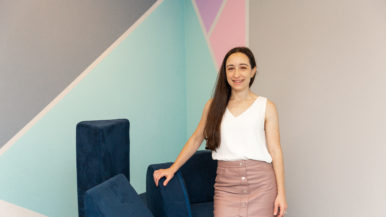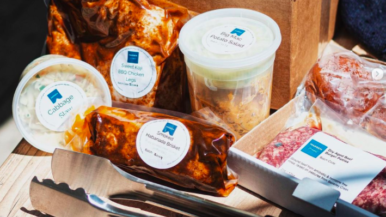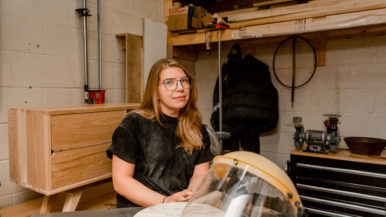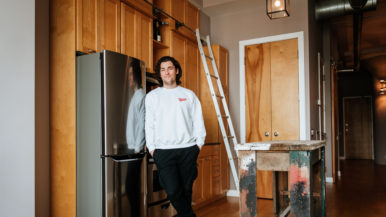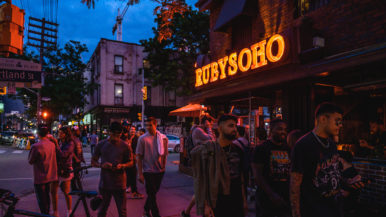“We still had DJs and performers, but everyone was at home”: How a queer dance party found a venue online

Last summer, I realized that there weren’t any queer parties in Toronto where I felt comfortable enough to make out on the dance floor. So I started my own: it’s a monthly party called Strapped, which I host at different venues around the city. We focus on being inclusive to queer women of colour and non-binary people of colour. Our resident DJ, Ace Dillinger, spins everything: R&B, hip-hop, dancehall, some soca here and there. Songs like “Act Up” by City Girls or anything by Megan Thee Stallion are Strapped anthems. I created something that I could see myself wanting to attend every month.
A Strapped party is an entire experience. We choose a new theme each month, and people come out in their hottest, kinkiest outfits. The very first theme, in August 2019, was Leather and Lingerie. The photos from that event created a lot of hype: everyone was like, “Wow, that’s where all the hot ladies go.” Another month we did Old Town Hoe. It was around the time “Old Town Road” was big, and people came in country-and-western outfits.
I’m an event producer, and I do drag king work on the side, so I know how many promoters, performers and venues are losing money as a result of the coronavirus pandemic. We had a Strapped party scheduled to take place at the Glad Day Bookshop on March 28. The theme was Glow, and we were going to decorate the space with glow-in-the-dark lights. When I saw all of my friends’ events being cancelled, I thought, There’s no way I’m going to cancel this. I wanted to be able to pay my DJs and performers. As soon as the pandemic hit, I posted on Instagram that the party was still happening—I just didn’t know how. My first thought was for DJs to send me a video of their sets, and I would put them together into one large video and stream that from my laptop to Facebook Live.
Then I discovered Club Quarantine, a party that takes place every night at 9 p.m. on Zoom, hosted by four artists from Toronto’s queer nightlife scene. I reached out, and they agreed to let us take over on the day at no cost. Now my DJs could all perform live to an audience that they could see, too. Advance tickets were $10, and on the night of the party, we would release a meeting code.
View this post on Instagram
On the night of our first virtual edition of Strapped, we still had our DJs and performer, but everyone was at home. Doors opened at 9 p.m. and within half an hour we had 440 attendees. Dillinger got the party started and everyone dancing with her smooth transitions and Brazilian funk. Later, when viewers started requesting soca, guest DJ Tamika Akimat had people waving flags and whining to “Lucy” by Destra Garcia.
As I scrolled through the grid I could see people sitting in bedrooms, kitchens, and living rooms. When Guest DJ Boston Chery from Brooklyn played a song about the coronavirus, it was fun to see everyone’s reactions. It’s important to find ways to make light of the current situation. In the chat box I asked where people were from and I got responses from Brazil, Germany, France, Russia, all over the U.S, and, of course, Toronto. I was so happy with this new party format and it seemed like people in the chat box were loving it too, typing things like “We love dykes.”
What I love about the queer community is that we always find a way to party. We’re using an app that’s meant for videoconferencing. And this kind of thing makes you temporarily forget what’s going on in the world. One of my DJs even prefers partying over Zoom now, because it’s nice to be at home. It’s also great to make your own drinks and have your own snacks. It’s a cathartic experience. You don’t have to be on video if you don’t want to; there’s no pressure. You can just be in the chat and cheer on all your friends.
I’m a single mother, and when my son goes off to his other family on the weekend, I’m alone. Before this, I never realized how much I needed social interaction. That really motivated me to keep the party going. I wanted to uplift people, especially in this difficult time. Being around my community makes my heart feel full. We have our next party scheduled for April 24. If people are sick, why shouldn’t they be able to come to the party? It’s opening us up to more possibilities. It feels like we’re living in the year 3005.
—As told to Isabel B. Slone
